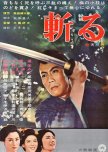"A man with a heretical style can live honorably"
Destiny’s Son aka Kiru was a lovely, if nihilistic, style over substance tale of a samurai’s journey of loss. Director Misumi Kenji crafted a spare film clocking in at 70 minutes based on story by author Kyoshiro Nemuri. I suspect people who have read the book would be able to fill in the narrative gaps in the film.
Takakura Shingo was given permission to take a three-year walkabout by his low ranking samurai father. When gentle Shingo returns everyone is surprised that he has developed incredible sword skills. This sets off a chain of events that leads to murder and Shingo taking to the road, this time for good. Skilled, loyal, and good-hearted, Shingo learns more about his background and the treachery of “honorable” samurai.
Death was a main character in this drama as it lurked behind every character. Betrayal and Deception were strong supporting characters as Shingo dealt with ambushes repeatedly. The young samurai vowed to never marry as he was unable to save the three women in his life nor were his skills successful in protecting his father figures. Shingo’s theme song could have been “Alone Again, Naturally.”
Most of the sword fights were of the swipe and fall variety. There was one notable exception. During a duel an opponent made like a banana and split vertically as his corpse fell to the ground. Shingo’s innovative style was considered heretical which I found amusing as if there was a sacred way to murder people.
Misumi created a very stylish film with a variety of framing and filming techniques. He pared the story down to the bare minimum, hitting the highlights in Shingo’s sad life. Ever at the mercy of merciless people and a merciless system, Shingo’s invincible sword skills could not protect his heart.
7 December 2024
Takakura Shingo was given permission to take a three-year walkabout by his low ranking samurai father. When gentle Shingo returns everyone is surprised that he has developed incredible sword skills. This sets off a chain of events that leads to murder and Shingo taking to the road, this time for good. Skilled, loyal, and good-hearted, Shingo learns more about his background and the treachery of “honorable” samurai.
Death was a main character in this drama as it lurked behind every character. Betrayal and Deception were strong supporting characters as Shingo dealt with ambushes repeatedly. The young samurai vowed to never marry as he was unable to save the three women in his life nor were his skills successful in protecting his father figures. Shingo’s theme song could have been “Alone Again, Naturally.”
Most of the sword fights were of the swipe and fall variety. There was one notable exception. During a duel an opponent made like a banana and split vertically as his corpse fell to the ground. Shingo’s innovative style was considered heretical which I found amusing as if there was a sacred way to murder people.
Misumi created a very stylish film with a variety of framing and filming techniques. He pared the story down to the bare minimum, hitting the highlights in Shingo’s sad life. Ever at the mercy of merciless people and a merciless system, Shingo’s invincible sword skills could not protect his heart.
7 December 2024
Cet avis était-il utile?

 55
55 204
204 11
11























